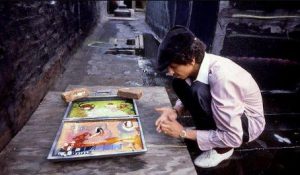Rammellzee Death
Rammellzee passed away on June 28, 2010 at the age of 50 in Far Rockaway, Queens, New York.
When did Rammellzee die?
June 28, 2010How old was Rammellzee when died?
50Where did Rammellzee die? What was the location of death?
Far Rockaway, Queens, New York
Rammellzee Birthday and Date of Death
Rammellzee was born in 1960 and died on June 28, 2010. Rammellzee was 50 years old at the time of death.
Birthday: 1960
Date of Death: June 28, 2010
Age at Death: 50
Rammellzee - Biography
RammellzeeFrom Wikipedia, the free encyclopediaRammellzee (stylized RAMM:ΣLL:ZΣΣ, pronounced "Ram: Ell: Zee"; late 1960 – June 27, 2010) was a visual artist, graffiti writer, performance artist, hip hop musician, art theoretician, and sculptor from New York City. Contents [hide] 1 Life and work1.1 Afrofuturism2 Discography3 See also4 References5 External linksLife and work Rammellzee's graffiti and art work are based on his theory of Gothic Futurism, which describes the battle between letters and their symbolic warfare against any standardizations enforced by the rules of the alphabet. His treatise, Ionic treatise Gothic Futurism assassin knowledges of the remanipulated square point's one to 720° to 1440°, details an anarchic plan by which to revise the role and deployment of language in society. He has stated that his name is derived from RAM plus M for Magnitude, Sigma (Σ) the first summation operator, first L - longitude, second L - latitude, Z - z-bar, Σ, Σ - summation. Rammellzee performed in self-designed masks and costumes of different characters which represented the "mathematical equation" that is Rammellzee. On the basis of his Gothic Futurism approach, he described his artistic work as the logical extension into a new phase which he calls Ikonoklast Panzerism. This artistic work has been shown in art galleries throughout the US and Europe. His Letter Racers, and other Noise includes artistic works by individuals mostly identified with their musical contributions. Rammellzee was also instrumental as one of the original hip hop artists from the New York area who introduced specific vocal styles which date back to the early 1980s. His influence can still be heard in contemporary artists such as Beastie Boys and Cypress Hill. His song Beat Bop was featured in the film Style Wars. Rammellzee makes a cameo appearance near the end of Jim Jarmusch's 1984 film Stranger Than Paradise.Discovered by a larger audience through the 1982 cult movie Wild Style by Charlie Ahearn, his fame in graffiti circles was established when he painted New York subway trains with Dondi, OU3, and Ink 76, and doctor Revolt. Rammellzee was also an occasional member of the Death Comet Crew, with Stuart Argabright, Michael Diekmann and Shinichi Shimokawa. In 1988, he and his band Gettovetts recorded the album Missionaries Moving. In 2003, Rammellzee released his debut album, This Is What You Made Me, and performed at the Knitting Factory in New York with the newly reformed Death Comet Crew. Subsequently Troubleman Unlimited re-released recordings made by DCC between 1982 and 1984. Their single for Exterior St was featured on the compilation Anti-NY with Ike Yard, Sexual Harassment, and Vivien Goldman, among others. In 2004, Rammellzee released his second album Bi-Conicals of the Rammellzee, produced by Gomma Records. Rammellzee also performed at Knitting Factory with guitarist Buckethead several times.Rammellzee was born in 1960 in Far Rockaway, Queens, New York, and died there on June 28, 2010, at the age of 49. Afrofuturism Rammellzee's work is generally considered to contribute to the canon of Afrofuturism, primarily through his repeated use of language as a technology. One of the central themes of Afrofuturist content is the use of language as a technology to transcend the Digital Divide. Conversely, Rammellzee had stated that "there is no such thing as Afro Futurism" and considered his work to be more part of a larger European monastic tradition than any part of an Afrofuturist tradition. The theory of Gothic Futurism attempts to deconstruct the English language as it is currently conceived. The battle between letters seen in the Ionic treatise deploys language as a technology to fight the oppressive nature of the alphabet. The introduction of a new mythology in the treatise suggests that Rammellzee's language can serve as a force of liberation, thereby lessening the Digital Divide.In addition, Rammellzee's Letter Racers are intended to pit each individual letter in galactic battles against each other, symbolically challenging the accepted standards and functionality of the 26-letter alphabet.Rammellzee's description of the Letter Racers is as follows:“Humans...in the 14th Century the monks ornamented and illustrated the manuscripts of letters. In the 21st and 22nd century the letters of the alphabet through competition are now armamented for letter racing and galactic battles. This was made possible by a secret equation known as THE RAMM:ELL:ZEE.” Rammellzee is celebrated in Big Audio Dynamite's song, 'Come On Every Beat Box'. In 2010 Buckethead released a tribute song called, 'Rammellzee: Hero of the Abyss'.Discography Studio albumsYear Album Title Charts2003 This Is What You Made Me —2004 Bi-Conicals of the Rammellzee —"—" indicates albums that did not chart.Singles & EPsRammellzee vs. K-Rob - Beat Bop (1983)Slinky Gym School Featuring Rammellzee - Crazy Sneaker (1984)Rammellzee + Shockdell - Death Command (1987)Gettovetts Featuring Rammellzee - Gangster Lean (1988)Cheesy Lipstick (7") (2003)Pay The Rent (12") (2004)Death Comet Crew Featuring The Rammellzee - This Is (Re)Phop (2005)Service Of Arms (CD Single, Limited Edition DVD) (2005)See also Carlo McCormick, The Downtown Book: The New York Art Scene, 1974–1984, Princeton University Press, 2006.Excerpts from Rammellzee's ICONIC TREATISE GOTHIC FUTURISM at Joseph Nechvatal's blog.References Jump up ^ Rammellzee. Iconic Treatise of Gothic Futurism.^ Jump up to: a b c Kennedy, Randy (June 30, 2010). "Rammellzee, Graffiti Artist, Dies at 49". New York Times.Jump up ^ Dery, Mark. "Introduction". In Mark Dery. Flame Wars: The Discourse of Cyberculture.Jump up ^ see Excerpts from Rammellzee's ICONIC TREATISE GOTHIC FUTURISMJump up ^ Rammellzee was often identified as an artist apart of the Afrofuturism canon[by whom?], a discourse concerned with revisioning racial identity through the tropes of science fiction and fantasy narrative or aesthetics.Jump up ^ Zwickel, Jonathan (August 9, 2004). "Death Comet Crew: This Is Riphop". Pitchfork Media. Retrieved April 15, 2011.Jump up ^ Tate, Greg (April 2004). "Rammellzee: The Ikonoklast Samurai". The Wire. Retrieved February 9, 2011.Jump up ^ Weiss, Jeff (July 1, 2010). "R.I.P. Rammellzee: The original abstract-rapping outlaw". Los Angeles Times. Retrieved July 3, 2010.Jump up ^ Galli, Chuck, "Hip-Hop Futurism: Remixing Afrofuturism and the Hermeneutics of Identity" (2009).Honors Projects Overview. Paper 18.








